考点5 情态动词
英语情态动词的用法
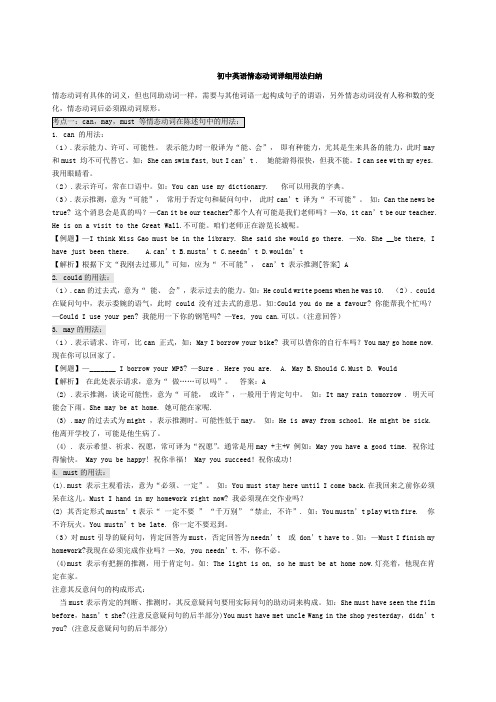
初中英语情态动词详细用法归纳情态动词有具体的词义,但也同助动词一样,需要与其他词语一起构成句子的谓语,另外情态动词没有人称和数的变化,情态动词后必须跟动词原形。
1. can 的用法:(1).表示能力、许可、可能性。
表示能力时一般译为“能、会”,即有种能力,尤其是生来具备的能力,此时may 和must 均不可代替它。
如:She can swim fast, but I can’t . 她能游得很快,但我不能。
I can see with my eyes. 我用眼睛看。
(2).表示许可,常在口语中。
如:You can use my dictionary. 你可以用我的字典。
(3).表示推测,意为“可能”,常用于否定句和疑问句中,此时can’t 译为“ 不可能”。
如:Can the news be true? 这个消息会是真的吗?—Can it be our teacher?那个人有可能是我们老师吗?—No, it can’t be our teacher. He is on a visit to the Great Wall.不可能。
咱们老师正在游览长城呢。
【例题】—I think Miss Gao must be in the library. She said she would go there. —No. She __be there, I have just been there. A.can’t B.mustn’t C.needn’t D.wouldn’t【解析】根据下文“我刚去过那儿”可知,应为“ 不可能”,can’t 表示推测[答案] A2. could的用法:(1).can的过去式,意为“ 能、会”,表示过去的能力。
如:He could write poems when he was 10. (2). could 在疑问句中,表示委婉的语气,此时 could 没有过去式的意思。
如:Could you do me a favour? 你能帮我个忙吗?—Could I use your pen? 我能用一下你的钢笔吗? —Yes, you can.可以。
U5情态动词may和不定式2022-2023学年牛津译林版八年级英语上册
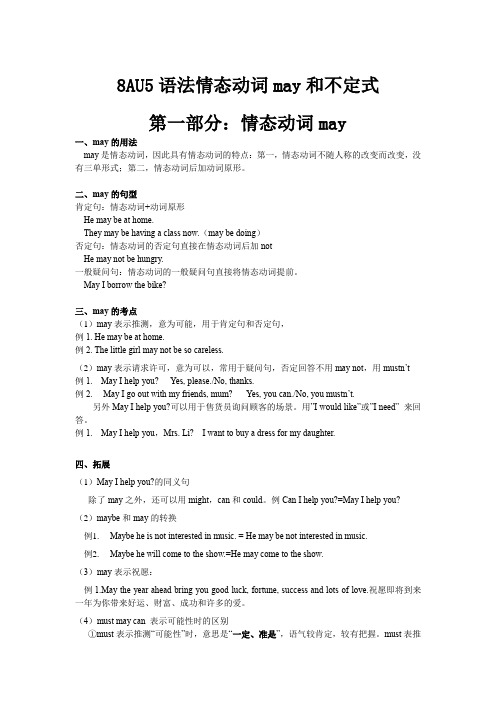
8AU5语法情态动词may和不定式第一部分:情态动词may一、may的用法may是情态动词,因此具有情态动词的特点:第一,情态动词不随人称的改变而改变,没有三单形式;第二,情态动词后加动词原形。
二、may的句型肯定句:情态动词+动词原形He may be at home.They may be having a class now.(may be doing)否定句:情态动词的否定句直接在情态动词后加notHe may not be hungry.一般疑问句:情态动词的一般疑问句直接将情态动词提前。
May I borrow the bike?三、may的考点(1)may表示推测,意为可能,用于肯定句和否定句,例1. He may be at home.例2. The little girl may not be so careless.(2)may表示请求许可,意为可以,常用于疑问句,否定回答不用may not,用mustn’t例1.---May I help you?----Yes, please./No, thanks.例2. ---May I go out with my friends, mum? ----Yes, you can./No, you mustn’t.另外May I help you?可以用于售货员询问顾客的场景。
用”I would like”或”I need” 来回答。
例1.---May I help you,Mrs. Li?---I want to buy a dress for my daughter.四、拓展(1)May I help you?的同义句除了may之外,还可以用might,can和could。
例Can I help you?=May I help you?(2)maybe和may的转换例1.Maybe he is not interested in music. = He may be not interested in music.例2.Maybe he will come to the show.=He may come to the show.(3)may表示祝愿:例1.May the year ahead bring you good luck, fortune, success and lots of love.祝愿即将到来一年为你带来好运、财富、成功和许多的爱。
情态动词的语法特征以及5大考点
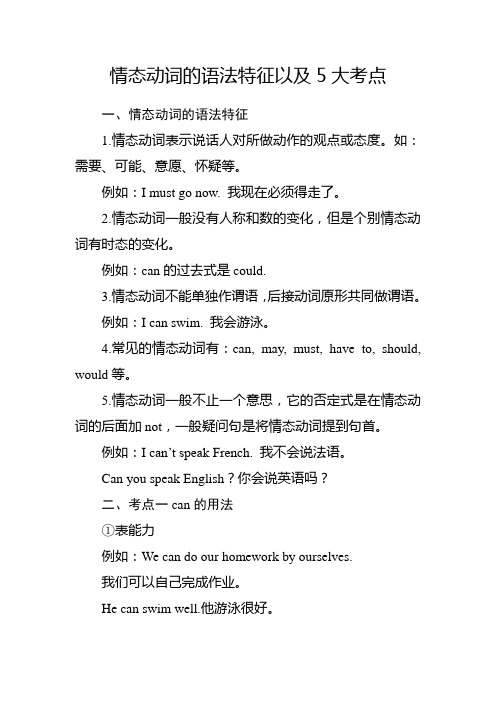
情态动词的语法特征以及5大考点一、情态动词的语法特征1.情态动词表示说话人对所做动作的观点或态度。
如:需要、可能、意愿、怀疑等。
例如:I must go now. 我现在必须得走了。
2.情态动词一般没有人称和数的变化,但是个别情态动词有时态的变化。
例如:can的过去式是could.3.情态动词不能单独作谓语,后接动词原形共同做谓语。
例如:I can swim. 我会游泳。
4.常见的情态动词有:can, may, must, have to, should, would等。
5.情态动词一般不止一个意思,它的否定式是在情态动词的后面加not,一般疑问句是将情态动词提到句首。
例如:I can’t speak French. 我不会说法语。
Can you speak English?你会说英语吗?二、考点一can的用法①表能力例如:We can do our homework by ourselves.我们可以自己完成作业。
He can swim well.他游泳很好。
I can play football but I can’t play the piano.我会踢足球但是我不会弹钢琴。
②表许可例如:You can watch TV after supper.晚饭后你可以看电视。
例如:You can’t play basketball in the street.你不能在街上打篮球。
③表请求例如:Can you help me with my math?你能帮我学数学吗?Could you lend your book to me?你能把你的书借给我吗?注意:could 是can的过去式,但是这里并不表示过去时,而是表示委婉语气。
④表示“不可能……”情态动词can的否定式,可以用来表示否定的推测,意为“不可能……”。
例如:That can’t be her father, because her father has gone to England.那人不可能是她爸爸,因为她爸爸已经去英国了。
【走向高考】2021高考英语 语法专题温习5 情态动词与虚拟语气试题精解(1)

语法专项(五) 情态动词与虚拟语气一、情态动词考点一can和could的用法1.表示惊讶,经常使用在否定句和疑问句中。
How could you do such a silly thing?你怎么能做那样的蠢事呢?2.表示可能性,意为“可能,有时会”。
can和could没有时态的不同,只是could不太确信。
Jogging can be harmful to the health.慢跑可能会对健康有害。
Accidents can/could h appen on such rainy days.如此的多雨天气可能会发生交通事故。
(客观的可能性)3.can用于否定句,意为“应该不是,不可能”。
I think it's all right. She can't make a mistake.我想应该没事,她不可能犯错误。
The story can't be true.那个故事不可能是真的。
4.cannot...too/enough表示“不管……也只是分”;“越……越好”。
You can't be too careful while driving.开车时越警惕越好。
You cannot remember enough English words.你记的英语单词越多越好。
5.cannot but+do sth.表示“不能不,只好”。
I couldn't but choose to go.我只好去。
[考题印证1](2021·安徽改编)It ________ be the vocabulary that caused you the problem in the exercise because you know a lot of words.不可能是辞汇致使了你练习中的问题,因为你明白很多的词。
解析:此题考查强调句和情态动词。
依照后半句“because you know a lot of words”,可知此处要用否定词,couldn't“不可能”。
情态动词考点

情态动词考点总结考点一:表示能力的情态动词。
Can , could , be able to ,was/were able to①can 表示现在的能力或者一般的能力。
②be able to 与can 的用法相同,区别是:can 的用法比较普遍。
③Could 表示过去的能力,不表示是否做成功。
④was/were able to 表示过去的能力,但是表示成功的做了某事。
⑤could have done 表示过去有能力做某事,但是没有做。
考点二:表示请求,允许的情态动词。
①当对方是决策者时,你代表自己或者第三者征求意见或者向对方请示,用shallMay /might/can/could I ……?(主语是第一人称)Could /will/would/can you ……..?(主语是第二人称)e.g. should we begin our class ?can/could I leave now ?when shall my teacher be able to leave hospital ?shall the driver wait outside ?②当你自己是决策者,给对方或者第三者以命令,许诺,警告或者威胁时,用 shall.此外当宣布法律,规定时,也是用此方法,用于第二人称和第三人称。
注意:①在回答以may 引导的问句时,一般来说避免用may 回答,以免显得太严厉或者不太客气,而用其他方式。
———may I come in ?_____yes ,please /sure/ certainly .please don’t/no ,you mustn’t.②……could /might I use your bike tomorrow morning ?……….yes , you may/can. No, I ‘m afraid not .考点三:表示可能性,推测的情态动词。
①对现在或者将来情况的推测:情态动词+do/be/be doing②对过去事情情况的推测:情态动词+have+过去分词③表示可能性,推测的情态动词按可能性大小依次排列:Must>should/ought to >may>might>could④表示否定推测常用:can’t, couldn’t 表示推测的语气非常肯定。
中考英语情态动词考点总结与归纳
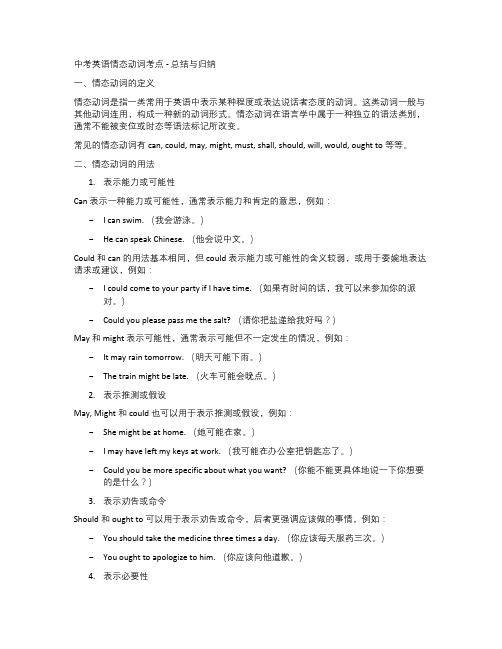
中考英语情态动词考点 - 总结与归纳一、情态动词的定义情态动词是指一类常用于英语中表示某种程度或表达说话者态度的动词。
这类动词一般与其他动词连用,构成一种新的动词形式。
情态动词在语言学中属于一种独立的语法类别,通常不能被变位或时态等语法标记所改变。
常见的情态动词有 can, could, may, might, must, shall, should, will, would, ought to 等等。
二、情态动词的用法1.表示能力或可能性Can 表示一种能力或可能性,通常表示能力和肯定的意思,例如:-I can swim. (我会游泳。
)-He can speak Chinese. (他会说中文。
)Could 和 can 的用法基本相同,但 could 表示能力或可能性的含义较弱,或用于委婉地表达请求或建议,例如:-I could come to your party if I have time. (如果有时间的话,我可以来参加你的派对。
)-Could you please pass me the salt? (请你把盐递给我好吗?)May 和 might 表示可能性,通常表示可能但不一定发生的情况,例如:-It may rain tomorrow. (明天可能下雨。
)-The train might be late. (火车可能会晚点。
)2.表示推测或假设May, Might 和 could 也可以用于表示推测或假设,例如:-She might be at home. (她可能在家。
)-I may have left my keys at work. (我可能在办公室把钥匙忘了。
)-Could you be more specific about what you want? (你能不能更具体地说一下你想要的是什么?)3.表示劝告或命令Should 和 ought to 可以用于表示劝告或命令,后者更强调应该做的事情,例如:-You should take the medicine three times a day. (你应该每天服药三次。
中考考点_情态动词知识点汇总
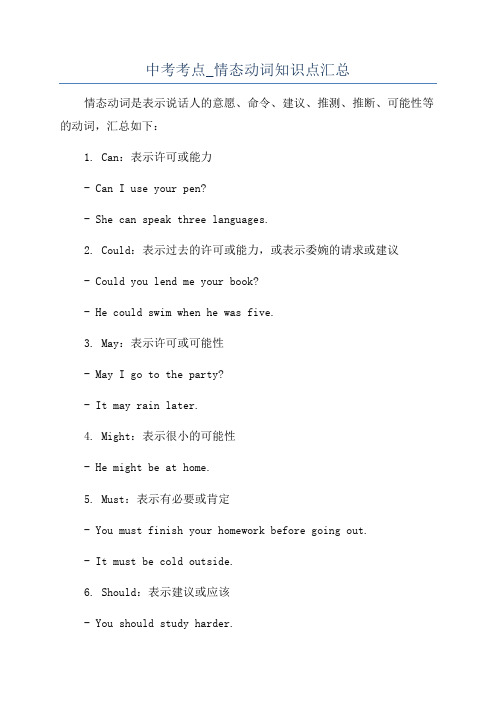
中考考点_情态动词知识点汇总情态动词是表示说话人的意愿、命令、建议、推测、推断、可能性等的动词,汇总如下:1. Can:表示许可或能力- Can I use your pen?- She can speak three languages.2. Could:表示过去的许可或能力,或表示委婉的请求或建议- Could you lend me your book?- He could swim when he was five.3. May:表示许可或可能性- May I go to the party?- It may rain later.4. Might:表示很小的可能性- He might be at home.5. Must:表示有必要或肯定- You must finish your homework before going out.- It must be cold outside.6. Should:表示建议或应该- You should study harder.7. Shall:表示征求意见或提出建议,或用于第一人称的疑问句中- Shall we go to the movies tonight?- What shall I do with this problem?8. Will:表示意愿、意愿、习惯或将来的行动- I will help you with your homework.- She will be here in a few minutes.9. Would:表示过去的意愿或习惯,或表示委婉的请求、邀请或建议- Would you like some tea?- He would always go for a walk after dinner.10. Ought to:表示应该,常用于表达责任或义务- You ought to apologize for what you did.这些是常见的情态动词,掌握它们的用法可以帮助你更准确地表达自己的意图和观点。
2020高考英语易错语法点30题专题05 情态动词(解析版)
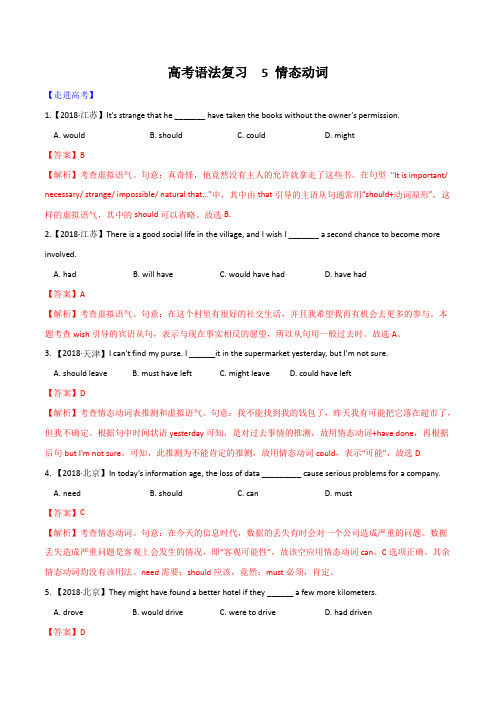
高考语法复习 5 情态动词【走进高考】1.【2018·江苏】It's strange that he _______ have taken the books without the owner’s permission.A. wouldB. shouldC. couldD. might【答案】B【解析】考查虚拟语气。
句意:真奇怪,他竟然没有主人的允许就拿走了这些书。
在句型"It is important/ necessary/ strange/ impo ssible/ natural that…"中,其中由that引导的主语从句通常用“should+动词原形”,这样的虚拟语气,其中的should可以省略。
故选B.2.【2018·江苏】There is a good social life in the village, and I wish I _______ a second chance to become more involved.A. hadB. will haveC. would have hadD. have had【答案】A【解析】考查虚拟语气。
句意:在这个村里有很好的社交生活,并且我希望我再有机会去更多的参与。
本题考查wish引导的宾语从句,表示与现在事实相反的愿望,所以从句用一般过去时。
故选A。
3.【2018·天津】I can't find my purse. I ______it in the supermarket yesterday, but I'm not sure.A. should leaveB. must have leftC. might leaveD. could have left【答案】D【解析】考查情态动词表推测和虚拟语气。
句意:我不能找到我的钱包了,昨天我有可能把它落在超市了,但我不确定。
初中英语中考情态动词考点及练习

情态动词情态动词又叫情态助动词;它们具有以下特点:⑴它们必须与其他动词连用,即:情态动词+动词原形表示说话人对所述动作的看法,如需要、可能、意愿或怀疑等;⑵绝大多数情态动词没有人称和数的变化,即第三人称单数不加-s以be和have 开头的情态动词短语除外;⑶在意义上,情态动词具有“多义性”;例:can既可表示能力,又可表示可能、允许等意义;情态动词的基本用法1. can的基本用法:⑴表示体力或智力上的能力,即“能够,会”,可与be able to转换;例:He can speak English. = He is able to speak English.—Can you play basketball— No, I can’t.如果表示将来具备的能力,要用will be able to;例:If I have a good sleep, I will be able to do the problem.⑵表示许可,主要用于口语,书面语一般用may;例:—Can we go home now, please— No, you can’t.You can only smoke in this room.You can’t keep the library books for more than a month.⑶表示“可能”,与may同义,但一般用在疑问句中;例:What can he possibly want在否定句中,否定形式can’t表示推测“不大可能”;例:Anybody can make mistakes.The news can’t be true.与第一、二人称连用时,还可以就可能的解决问题的方式或可能的行为提出建议;在这里,也可用could使语气婉转;例:Can / Could we meet again next week 下周我们可以再见面吗—What shall we do 我们怎么办呢— We can / could try asking Lucy for help.——我们可以请露茜帮忙试试看;You can / could help me with the cooking. 你可以帮我做饭;2. may的基本用法:⑴表示“许可”,用can比较口语化;例:You may / can come if you wish. 如果你想来,你就来;You may not pick flowers in this park. 本公园内不许摘花;may not表示按规定不许可,如果用mustn’t则表示说话人不许可;我可以在这里抽烟吗—;mustn’t表示明确的禁止;⑵;例:It may rain tomorrow. 明天可能会下雨;;注意:如果,通常用例:那会是真的吗他究竟是谁呢⑶注意—Yes, you —No3. must的基本用法:⑴表示必须,强调说话人的主观意志;例:I must go now, or I’ll be late.You must be here by注意:表示“必须“时,must的否定式为或而不是mustn’t;也就是:—Must—Yes, you—No, you例:——No, you .⑵表示推测,一般只用于肯定陈述句,表示非常肯定;例:She didn’t look at me. She must be angry. 她不朝我看,一定是生气了;He is good at English. He must know the word. 他英语好,准知道这个词;You must be Mr. Jones. 想必您就是琼斯先生吧;4. have to的基本用法:have to可视为情态动词,但它与其他情态动词在用法上稍有不同;其他情态动词没有人称和数的变化,而have to却有人称和数的变化,要视主语的不同而变化;例:I / You / We / They have to….He / She / It has to….You don’t have to….意思是“必须,不得不”;have to强调客观需要;例:Sorry, I have to leave now. 对不起,现在我得走了;I’ve got to go to a meeting. 我得去参加一个会议;Will he have to work deep into the night 他将不得不工作到深夜吗5. need的基本用法:need的基本词义是“需要”,它既可作情态动词,又可作实义动词;⑴ need用作情态动词时,只用于否定句和疑问句;它只有一种形式,后接动词原形;例:I don’t believe you need worry. 我相信你没有必要焦急;—Need we go so soon我们需要这么早就去吗— Yes, we must. / No, we needn’t.是的,必须;/不,不必;So I needn’t tell him, need I 所以我不需要告诉他,对吧请比较以下两句话的不同意思:You needn’t buy the coat. 你没有必要买那件外衣;你还没买You needn’t have bought the coat. 你没有必要买这件外衣的;而你⑵My watch needs mending/to be mended. 我的手表需要修理了;We don’t need to work today. = We needn’t work today.Does he need to go right now = Need he go right now6. had better的基本用法:had bette r常略作’d better;现代语法认为它是一个助动词,因为它后接不意思是“最好做某事;还是做某事比较好”;get some sleep. 你最好睡一会儿;You’d better not do that again. 你最好别再做那件事;What had we better do now 我们现在怎么做才好呢, should, would, might表示推测:①.must多用于肯定句中表示把握性极大的推测,意思为“一定、肯定”;如: You have worked hard all day. You must be tired. 你已辛苦工作一整天了,一定累了;The book must be his. His name is on the cover. 这本书一定是他的,封面上写着他的名字;注意 must不表推测时,在肯定句中意思为“必须强调内在的职责”,在否定句中意思为“不许、禁止”,以它开头的疑问句否定回答常用needn’t或don’t doesn’t have to;如:We must obey the traffic rules. 我们必须遵守交通规则;Cars mustn’t be parked here. 此处严禁停车;—Must we hand in the papers this week 我们必须本星期交论文吗—No, you needn’t. 不,你们不必本星期交;②. can / could多用于否定句、疑问句或间上没有差别;用can时不相信的程度更强一些,如:The man under the tree can’t be Tom人不可能是Tom,他已经去英国了;Can it be true that he was fooled by a five-year-old boy 他被一个五岁的孩子愚弄了,这能是真的吗Could this be an excuse 这会不会是个借口How can you be so careless 你怎么这样粗心③.may / might多用来表示把握性不大的推测,意思为“也许、可能”, might比;注意区分“不可能”与“可能;如:Mr. Wang may know Professor Li’s telephone number.王先生也许知道李教授的电话号码;This might be the key Tom has been looking for.这可能就是汤姆一直在找的钥匙;She may not be there today. 今天她可能不在那儿;一、典型例题中考链接1.—Who is the man over there Is it Mr. Li— No, it ______ be him. Mr. Li is much taller.A. mustn’tB. may noC. can’tD. needn’t2.—Must I go with them tomorrow— No,you ______.A. mustn'tB. shouldn'tC. needn'tD. can't3.—______ I take some photos in the hall— No, you ______.A. Can, needn’tB. Must, mustn’tC. Could, won’tD. May, m ustn’t4.—Dad, must I finish my homework today—No, you ________. You may do it tomorrow.A. needn’tB. mustn’tC. don’tD. won’t5.—The lake is said to be dry. Is that true—It , some kids are swimming in it.A. must be trueB. can’t be trueC. may not be true6.—What is your mother going to do this Saturday—I’m not sure. She _____ go to see my grandmother.A. canB. mustC. may7.—Susan has bought a large house with a swimming pool.—It ______ be very expensive. I never even dream about it.A. mustB. mightC. can’tD. shouldn’t8.—Listen Is Professor Johnson giving a report in the hall —No, it be him. He has gone to Japan.A. needn’tB. may notC. mustn’tD. can’t9.—Let’s go to the West Hill Park by taxi.—Oh, it is not far away from here. We _______take a taxi.A. couldn’tB. mustn’tC. needn’tD. can’t10.—Can you play the piano—Yes, I _______. I often practice it on weekends.A. needn’tB. needC. can’tD. can三、课后练习一、用can, may, must, need, have to, had better的适当形式填空:1.You ________________ return the library book on time.2.I ______________ not find the way to the hospital. _______________ youshow me the way3.—________________ I finish the work right now— No, you ________________ not. You ____________ do it later.4.He said he ________________ not come tonight.5.Her mother was ill. She ________________ stay at home and look afterher.6.It’s time for class. You ________________ stop playing football oryou __________be late for class.7.We ________________ start right now, or they would get there first.8.The cloud is lifting, so it ________________ not be a rainy daytomorrow.二、选择填空1.—Do we have to finish our homework this afternoon—Yes, you ________.A. mustB. canC. mayD. need2. —Must I be in hospital for a week, Doctor—No, you . You can go back home tomorrow.’t B.needn’t C. must3. The desk is not dirty. You _______clean it.A. mustn’tB. shouldn’tC. needn’t C. can’t4. —May I watch TV for a while—No, you _______. You have to finish your homework first.A. shouldn’tB. needn’tC. mustn’tD.won’t5.—Is Jessica giving us a speech this evening—No, it ________be her. She________ to Japan.A. mustn’t; has goneB. mustn’t ;has beenC. can’t ;hasgone D. can’t ;has been6. It’s the library So you________ know shouting is no t allowed here.A. canB. mustC. needD. may7. Boys and girls, don’t forget your report . It ______ today.A. can’t finishB. can’t be finishedC. should finishD. should be finished8.—Mr Smith must have been to your home this morning.—No, he ______ ,because he didn’t know my address.A. couldn’tB. can’tC. mustn’tD. may not9. —Must I mop up the window now—No, you________.’t B. can’t C. shouldn’t D. mustn’t10. —Is Lucy knocking at the door—No. It ________ be Lucy. She is in Japan now.A. needn’tB. mustC. can’t11. —Another cup of coffee—No, thanks. I _____ be off. Mary is waiting for me.A. canB. mayC. mustD. might12. —I’m a little tired. Let’s go to t he zoo by taxi.—We take a taxi. It’s not far from here.A. can’tB. mustn’tC. couldn’tD.needn’t13. If the traffic light is red, you ________ cross the road. It’s very dangerous.A. don’tB. mustn’tC. needn’tD.wouldn’t14. —Must I finish watering the flowers now—No, you________.A. mustB. won’tC. needn’tD. can’t15. —I can’t give up smoking, doctor.—For your health, I’m afraid you ________.A. mayB. canC. have toD. must。
高中英语知识点归纳情态动词的复合用法与考点

高中英语知识点归纳情态动词的复合用法与考点高中英语知识点归纳:情态动词的复合用法与考点情态动词是英语中常见的一类词汇,具有特殊的语法和用法。
它们在句子中常常与其他动词搭配使用,用于表示各种语气、态度和推测等。
本文将归纳总结高中英语中情态动词的复合用法,并分析其中的考点。
一、can/could1. 表示能力和技能:e.g. She can swim very well.e.g. I could speak three languages when I was younger.2. 表示请求和允许:e.g. Can I borrow your pen, please?e.g. Could you open the door for me?3. 用于提出建议和给出意见:e.g. You can try contacting him tomorrow.e.g. I could suggest a few books for you to read.4. 表示可能性和推测:e.g. It can be a difficult task.e.g. He couldn't have arrived here so early.二、may/might1. 表示允许和请求:e.g. May I use your phone?e.g. Might I have a glass of water, please?2. 表示可能性和推测:e.g. It may rain later.e.g. He might be running late for the meeting.3. 用于表达祝愿和提出建议:e.g. May you have a wonderful journey.e.g. You might want to consider studying abroad.三、must1. 表示强烈的责任和义务:e.g. I must finish my homework before going out.e.g. We must obey the rules and regulations.2. 表示肯定的推断和确定:e.g. He must be the new teacher.e.g. They must have left already.四、shall/should1. 表示将来的计划和意图:e.g. We shall meet at the library tomorrow.e.g. I should go to bed early tonight.2. 表示义务和建议:e.g. You shall obey the rules of the school.e.g. We should do our best to protect the environment.五、will/would1. 表示未来的动作和事件:e.g. He will come to the party tomorrow.e.g. We would like to invite you to our wedding.2. 表示习惯和倾向:e.g. She will always help others in need.e.g. He would often go for a walk in the park.3. 用于提出请求和邀请:e.g. Will you please pass me the salt?e.g. Would you like to join us for dinner?六、ought to1. 表示应该和责任:e.g. You ought to apologize for your behavior.e.g. They ought to take care of their health.2. 用于提出建议和表示期望:e.g. You ought to study harder for the exam.e.g. They ought to arrive on time for the meeting.在高中英语考试中,情态动词的复合用法常常成为考点。
(完整版)高考情态动词讲解

语法专题(三)情态动词考点归纳考点一:情态动词表示能力1.表现在的或一般的能力:表示现在的或一般的能力用can或be able to,can 比be able to 使用得更普遍。
can 侧重指有能力做某事;而be able to更强调通过努力、克服困难做成某事。
A computer can't think for itself ;it must be told what to do.He is a native speaker of English,so he can of course speak English quite well.2.表示将来的能力:表示将来能力用will be able to。
If you have a good sleep,you will be able to work out this problem.如果你睡个好觉,你就能做出这道题。
3.表示过去的能力:could 表示过去一般的能力,即不表示做或未做某事;而was (were) able to do则表示过去有能力并且成功地做了某事,相当于managed to do something/succeeded in doing somethin。
g考点二:情态动词表示推测(可能性)可能性可分为客观的(理论的)可能性和具体事情实际发生的可能性。
1.客观的(理论的)可能性指并不涉及具体某事是否会发生,此种用法常常可以说明人或事物的特征。
can 用于肯定句中表示客观的(理论的)可能性,can用于疑问及否定句中则表示实际发生的可能性。
The World Wide Web is sometimes jokingly called the World Wide Wait because it can be very slow.A left- luggage office is a place where bags can be left for a short time,especially in a railway station.2.表示具体事情实际发生的可能性:表示具体事情实际发生的可能性的这些词后接动词原形是对现在事情的推测,后接完成式则表示对过去事情的推测;其中can,may/might,should,ought to,must 有时还可接进行时表示对现在正在进行的事情的推测。
专题05 单项选择之实义动词、动词短语、情态动词(原卷版)
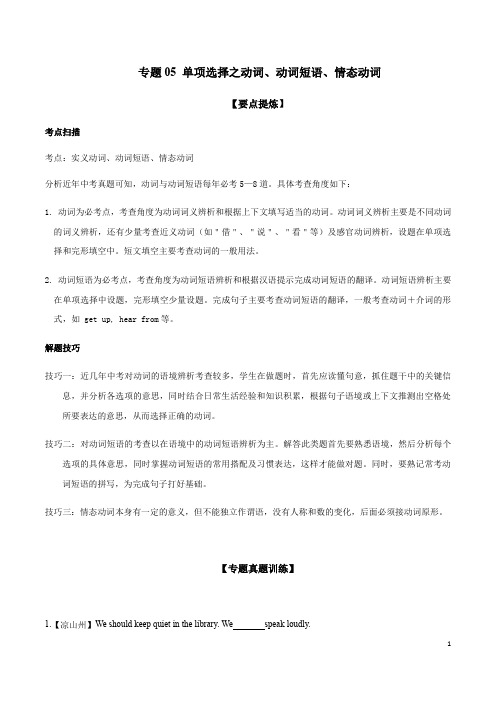
专题05 单项选择之动词、动词短语、情态动词【要点提炼】考点扫描考点:实义动词、动词短语、情态动词分析近年中考真题可知,动词与动词短语每年必考5—8道。
具体考查角度如下:1. 动词为必考点,考查角度为动词词义辨析和根据上下文填写适当的动词。
动词词义辨析主要是不同动词的词义辨析,还有少量考查近义动词(如"借"、"说"、"看"等)及感官动词辨析,设题在单项选择和完形填空中。
短文填空主要考查动词的一般用法。
2. 动词短语为必考点,考查角度为动词短语辨析和根据汉语提示完成动词短语的翻译。
动词短语辨析主要在单项选择中设题,完形填空少量设题。
完成句子主要考查动词短语的翻译,一般考查动词+介词的形式,如 get up, hear from等。
解题技巧技巧一:近几年中考对动词的语境辨析考查较多,学生在做题时,首先应读懂句意,抓住题干中的关键信息,并分析各选项的意思,同时结合日常生活经验和知识积累,根据句子语境或上下文推测出空格处所要表达的意思,从而选择正确的动词。
技巧二:对动词短语的考查以在语境中的动词短语辨析为主。
解答此类题首先要熟悉语境,然后分析每个选项的具体意思,同时掌握动词短语的常用搭配及习惯表达,这样才能做对题。
同时,要熟记常考动词短语的拼写,为完成句子打好基础。
技巧三:情态动词本身有一定的意义,但不能独立作谓语,没有人称和数的变化,后面必须接动词原形。
【专题真题训练】1.【凉山州】We should keep quiet in the library. We speak loudly.A. mustB. mustn’tC. canD. needn’t2.【新疆维吾尔族自治区】David, you please sweep the floor and take out the trash?A. couldB. mayC. mightD. must3.【湖北省宜昌】— A little bird entered through the open window to join us for dinner last night.—Wow, the unexpected guest welcomed.A. will beB. must beC. won’t beD. mustn’t be4.【四川省眉山市】— I can’t find my phone anywhere.— You have lost it while shopping.A. mayB. canC. shouldD. would5.【湖北省咸宁市】— Listen! Is Sarah singing in the neighbor room?— No. It be Sarah. She has gone to Italy.A. needn’tB. may notC. can’tD. won’t6.【襄阳市】— The driver be hurt badly in the accident.— That’s true. Let’s send him to the hospital as soon as possible.A. needB. can’tC. mustD. may not7.【大庆市】How long will it ____ you to fly to Beijing from your hometown?A. spendB. takeC. payD. use8.【广西北部湾经济区】—Must I hand in the homework right now?—________. That’s the rule.A. Yes, you can.B. No, you can't.C. Yes, you mustD. No, you mustn’t.9.【贵州省毕节市】— I take the magazine out of the reading room?— I’m sorry you .A. Could; couldn’tB. Must; couldn’tC. Will; can’tD. May; can’t10.【大庆市】We ____ pay to get into the concert, because it’s free.A. mustn’tB. can’tC. don’t need toD. might not11.【四川省广元市】We’d better __________ our sports meeting because it’s going to rain.A. put onB. put upC. put off12.【广西贵港市】—Joe,don't eat too much ice-cream.—OK,mom.But it really good.A.feels B.looks C.tastes D.sounds 13.【贵阳市】Dad,my bike is broken. I use yours?”“Sure! It's in the backyard.”A. MustB. ShouldC. May14.【广西河池市】—Is that red schoolbag Mary’s?—It _______ be hers. She hates that color.A. mayB. mustC. can’tD. might15.【河南省】Jerry didn’t pay me back, but he promised that he this Sunday.A. mustB. couldC. wouldD. should16.【四川省达州市】—Can I _____________ Robinson Crusoe? Mrs. Zhao.—Sure,it's very interesting,but you can only ______________it for two weeks.A.borrow;lend B.lend;borrowC.borrow;keep D.lend;keep17.【辽宁省本溪市】The man _______ be a doctor in this hospital,but I'm not sure.A.must B.would C.can D.might18.【四川省内江市】—_______I return the books this week?—No, you _______. You can do that next week?A. Must; can’tB. May; needn’tC. Need; mustn’tD. Must; needn’t19.【天水市】—Listen! Is that Linda playing the piano in the room?—No. It be Linda, she has gone to London,A. may notB. needn’tC. can’tD. mustn’t20.【江苏省无锡市】With their new lock, you __________ search for keys in your bag any more. Isn’t it cool?A. needn’tB. can’tC. mustn’tD. shouldn’t21.【新疆维吾尔族自治区】Not only Jack but also I crazy about the football match.A. amB. isC. areD. be22.【新疆维吾尔族自治区】—I’m afraid his radio is too noisy. Will you please _____ him to _____ a little.A. ask;turn it downB. allow;turn it onC. tell;turn it upD. advise;turn it off23.【新疆维吾尔族自治区】Mum likes soap operas. Let's buy a TV for her.A. becomingB. watchingC. lookingD. smelling24.【内蒙古呼和浩特市】—Jack, let’s have a picnic after school.—Sorry. I have ______Frank to work on the biology report with him.A. AdviseB. expectedC. suggestedD. promised25.【湖北省宜昌市】—Shall we________the things we don’t use to the people in need?—Good idea.A. put offB. set outC. get intoD. give away26.【湖北省宜昌】—About 20 million people in the world have no enough safe drinking water.—So we should how to deal with the problems of water.A. put onB. look afterC. think aboutD. get on with27.【湖南省岳阳市】The volunteers _____ the sick kids in the hospital on weekends.A.look after B.look for C.look through28.【贵州省安顺市】—I don't think teachers should give too much homework to_______ the free time of students.A. give upB. take upC. look upD. put up29.【四川省眉山市】—What’s the meaning of “One Belt and One Road”?— Let me the words in the new dictionary.A. look atB. look forC. look afterD. look up30.【湖北省咸宁市】— Jimmy, the books are everywhere in your study.— Sorry, Mom. I’ll____at once.A. put them onB. put them awayC. put them outD. put them up31. 【襄阳市】— Does the old man have to his wife?— Yes. They have no children to depend on.A. look afterB. look forC. look upD. look like40.【襄阳市】— Your sister _ your mother very much.— Many people regard them as sisters when they hang out together.A. cares forB. takes afterC. helps outD. believes in41.【湖南省益阳市】—Kate, _________ the TV, please. It's time to go to bed.—OK, mom.A. turn onB. turn offC. turn up42.【江苏省南京市】Tina comes to China in order to experience Chinese culture and _____which university is thebest for her to attend.A.put out B.stay outC.find out D.run out。
情态动词
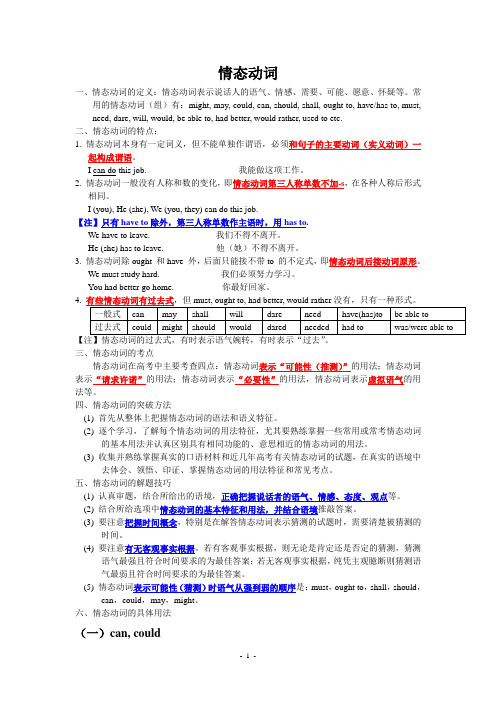
情态动词一、情态动词的定义:情态动词表示说话人的语气、情感、需要、可能、愿意、怀疑等。
常用的情态动词(组)有:might, may, could, can, should, shall, ought to, have/has to, must, need, dare, will, would, be able to, had better, would rather, used to etc.二、情态动词的特点:1. 情态动词本身有一定词义,但不能单独作谓语,必须和句子的主要动词(实义动词)一起构成谓语。
I can do this job. 我能做这项工作。
2. 情态动词一般没有人称和数的变化,即情态动词第三人称单数不加-s,在各种人称后形式相同。
I (you), He (she), We (you, they) can do this job.【注】只有have to除外,第三人称单数作主语时,用has to.We have to leave. 我们不得不离开。
He (she) has to leave. 他(她)不得不离开。
3. 情态动词除ought 和have 外,后面只能接不带to 的不定式,即情态动词后接动词原形。
We must study hard. 我们必须努力学习。
You had better go home. 你最好回家。
4.【注】情态动词的过去式,有时表示语气婉转,有时表示“过去”。
三、情态动词的考点情态动词在高考中主要考查四点:情态动词表示“可能性(推测)”的用法;情态动词表示“请求许诺”的用法;情态动词表示“必要性”的用法,情态动词表示虚拟语气的用法等。
四、情态动词的突破方法(1) 首先从整体上把握情态动词的语法和语义特征。
(2) 逐个学习,了解每个情态动词的用法特征,尤其要熟练掌握一些常用或常考情态动词的基本用法并认真区别具有相同功能的、意思相近的情态动词的用法。
(3) 收集并熟练掌握真实的口语材料和近几年高考有关情态动词的试题,在真实的语境中去体会、领悟、印证、掌握情态动词的用法特征和常见考点。
情态动词

情态动词情态动词(Modal verbs)本身有一定的词义,表示语气的单词。
但是不能独立作谓语,只能和动词原形一起构成谓语。
情态动词用在行为动词前,表示说话人对这一动作或状态的看法或主观设想。
情态动词虽然数量不多,但用途广泛,主要有下列: can (could), may (might), must, need, ought to, dare (dared), shall (should), will (would)四大分类①只做情态动词:may, might, must…②可做情态动词又可做实义动词:如:need, dare.can...③具有情态动词特征:have(had,has) to,used to, ought to④可做情态动词又可作助动词:如:shall(should),will(would)注意①mustn't代表强烈禁止, must表示主观,have to表示客观。
②美式英语中常用must not 而不用 mustn't. mayn't,mightn't和shan't也很少用常用can (could), may (might), must, need, ought to, dare (dared), shall (should), will (would)位置具有助动词作用,可以用来构成否定句,疑问句及用于简单回答。
Can you sing English songs?你会唱英语歌吗?Yes ,I can. 是的,我会。
后接动词原形,接不带to的不定式。
She may lose her way. 她可能迷路了。
无人称和数的变化。
We must stay here. 我们必须待在这儿。
He must stay here. 他必须待在这儿。
有一定的词义,但并不完整,必须与动词原形一起构成谓语。
(后面加动词原形)在以Could引导的表示委婉语气的疑问句,常用来表示请求别人帮助或对长辈的请求的。
高中情态动词用法重点考点

16.You take your umbrella. I am sure it won't rain. A. shouldn't B. can't C. don't have to D. mustn't 17.The dog hibernate in winter. A. don't need B. doesn't need to C. needs not to D. needs not 18.Look what you have done. You have been careful. A. should B. can C. must D. may 19.Tom did not go to the party yesterday, or I him. A. would see B. could meet C. might have seen D. might see 20. — Let's go to the cinema, shall we? — ? A. No, I can't B. Yes, I will C. Yes, thank you D. No, we'd better not
C. To not punished
D. not be punished
二、情态动词+do/be 表对现在推测 1、肯定的推测: must的语气最强,译为“肯定”、 should的语气次之,译为“很可能”、“应该”; 按常理推测; may(might), could语气最弱,译为“也许”。 2、否定的推测: may not,might not或could not, “可能不”“也许 不”,语气不很肯定; can’t, “根本不可能”、“想必不会”,否定语气 较强 3、疑问句中推测:往往用can或could
中考英语语法复习方案6--情态动词

中考英语语法复习方案6《情态动词》【趋势解读】情态动词是各地中考的必考点,主要考查情态动词的基本用法,考题贴近生活实际,体现语言学习的实用性。
要求考生熟知情态动词的基本特点,掌握常见倩态动词的各种用法。
考生答题时需认真体会语境,揣摩说话者的语气强弱和态度。
难度适中,一般分值在1}2分。
预计中考关于本专题知识命题趋势如下:(1)各地中考情态动词考查的热点为表推测、许可及义务含义的情态动词,尤其是对must 三种用法的考查是重中之重。
(2)自主招生考试的重点将关注情态动词表示推测的用法及情态动词与现在完成时连用。
分值为1~2分。
【思维引导】精彩笔记1 表示能力的情态动词注意:表示具有某种能力的还有半情态动词be able to,但是和can有区别,can只有现在式和过去式。
be able to可以有更多的时态。
核心题根1 (1) I'm going to Europe on vacation together with John if I find the money.A. canB. mightC. wouldD. need思路点拨:①考查情态动词表示能力。
②句意:如果我现在能有足够的钱,我将和John一起去欧洲度假。
③ can“能,会”,表示体力、智力、技能方面的能力;might“可能,可以”,表示可能性推测;would“愿意”;need“需要”,表示必要。
(2)—No one be compared with Yao Ming in playing basketball.—Oh,you are really his big fan.A. canB. needC. mustD. might思路点拨:①句意:—在打篮球方面没有人能和姚明相比。
—你真是他忠实的粉丝。
②此处应填表示能力的情态动词。
can“能,会”,表示能力;need“需要”;must“必须”,表示义务;might“可以,可能”,表示请求许可或可能性的推测。
情态动词考点解析(Word版附答案)经典
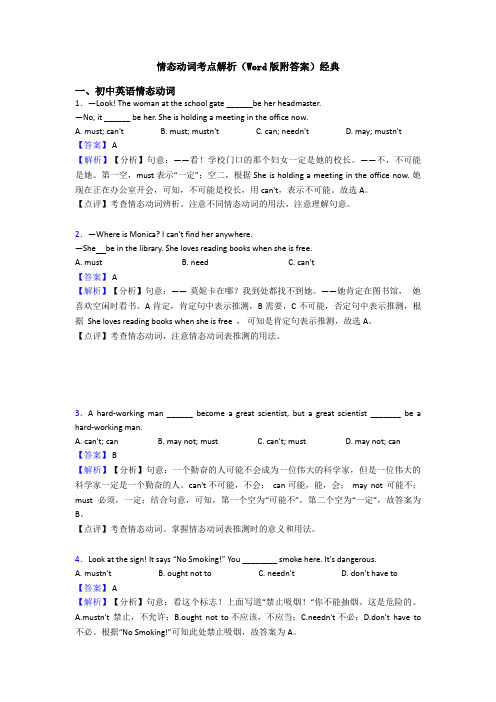
情态动词考点解析(Word版附答案)经典一、初中英语情态动词1.—Look! The woman at the school gate ______be her headmaster.—No, it ______ be her. She is holding a meeting in the office now.A. must; can'tB. must; mustn'tC. can; needn'tD. may; mustn't【答案】 A【解析】【分析】句意:——看!学校门口的那个妇女一定是她的校长。
——不,不可能是她。
第一空,must表示“一定”;空二,根据She is holding a meeting in the office now. 她现在正在办公室开会,可知,不可能是校长,用can't,表示不可能。
故选A。
【点评】考查情态动词辨析。
注意不同情态动词的用法,注意理解句意。
2.—Where is Monica? I can't find her anywhere.—She be in the library. She loves reading books when she is free.A. mustB. needC. can't【答案】 A【解析】【分析】句意:——莫妮卡在哪?我到处都找不到她。
——她肯定在图书馆,她喜欢空闲时看书。
A肯定,肯定句中表示推测,B需要,C不可能,否定句中表示推测,根据 She loves reading books when she is free ,可知是肯定句表示推测,故选A。
【点评】考查情态动词,注意情态动词表推测的用法。
3.A hard-working man ______ become a great scientist, but a great scientist _______ be a hard-working man.A. can't; canB. may not; mustC. can't; mustD. may not; can【答案】 B【解析】【分析】句意:一个勤奋的人可能不会成为一位伟大的科学家,但是一位伟大的科学家一定是一个勤奋的人。
- 1、下载文档前请自行甄别文档内容的完整性,平台不提供额外的编辑、内容补充、找答案等附加服务。
- 2、"仅部分预览"的文档,不可在线预览部分如存在完整性等问题,可反馈申请退款(可完整预览的文档不适用该条件!)。
- 3、如文档侵犯您的权益,请联系客服反馈,我们会尽快为您处理(人工客服工作时间:9:00-18:30)。
考点5 情态动词情态动词的词义辨析情态动词在情景交际中的用法情态动词+have+过去分词结构情态动词的一些习惯用法含有情态动词的反意疑问句经典易错题会诊命题角度l 情态动词的词义辨新1. If it were not for the fact that she sing, I would invite her to the party.A. couldn' tB. shouldn' tC. can' tD. might not[专家把脉] C本题考查情态动词的基本意义和用法。
couldn’t是call’t的过去式,有“不能,不可能或不可以”之意;shouldn’t不应该;might not不可能。
句中if引导的是虚拟语气,故A不对。
2.Some aspects of a pilot' s job be boring, and pilots often work at inconvenient hours oA. can ; have toB. may ; canC. have to; mayD. ought to; must[专家把脉]A 本题的解题思路要从情态动词的基本意义和用法开始。
按照情景,“飞行员的工作的某些方面可能是令人厌烦的,而且他们经常不得不在很不方便的情况下工作。
”3. The World Wide Wed is some times jokingly called the World Wide Wait because it be very slow.A. shouldB. mustC. willD. can[专家把脉]D本题考查can在肯定句中的用法_.can常用于否定句、疑问句中表推测,但也可用于肯定句中表“一时的可能性”。
4. "The interest be divided into five parts, according to the agreement made by both sides," declared the judge.A. mayB. shouldC. mustD. shall[专家把脉]D 句意为“法官宣布:‘按照双方协议,利息被分作五个部分。
…法官宣布的决定有法律效力,不得违背,而且表示说话人(及其所代表的一方)的决心、意志、允诺等,shall用于第二、三人称时,有此用法。
must可译作“必须”,但只是一种主观要求,不具备shall的毋庸置疑的决定口气。
5. John, look at the time. you play the piano at such a late hour?A. MustB. CanC. MayD. Need[专家把脉] AA项意思是:干嘛,偏要,硬要(指做令人不快的事);B项:能,可能;c项:可以;D项:有必要。
根据题干“看看时间吧,你干嘛要这么晚弹钢琴?”专家会诊情态动词的基本用法:I. can (could)1.表示体力或脑力方面的能力,或根据客观规律能做某事的能力,意思是“能够”。
can表“能够”时,既可指将来,也可指现在。
be able to在表示能力时与can同义,但可用于各种时态,强调通过努力克服困难成功地做成某事,相当于managed to do 或succeeded in doing。
如:No one can ( is able to ) finish such a difficult thing. He can speak English.I can go there now. With the help of the firemen, the trapped peopie was able to leave the burning building. (不能用could)2.表示许可、允许,在疑问句中表示“请求,许可”,否定句中表示“不许”,此时可与may通用,有时cannot可以表示“禁止”,相当于“mustn’t”,如:May ( Can ) I help you?That sort of thing can ' t go on !You can't ( mustn' t, are not allowed to ) play computer games again.3.表示推测,强调客观可能性“可能、会”,Call多用于疑问句和否定句,表示猜测时,情态动词后可用进行式或完成式。
如:—There comes a man. Who can it be?—No, it can' t be him. He has gone to America !He can' t have gone there alone.4.could表示“能力”“可能性”“许可”,为earl的过去式。
一般用于委婉、客气地提出问题或陈述看法,此时can,could并没有时间上的差别,只是could的语气更客气些。
回答时用原形回答。
如:—Could I borrow your English dictionary?—-Of course you Call. Go ahead. If. may, might(might 为may 的过去式)1.表示许可,有“可以”的意思,询问一件事可不可以做,有时可以与can互换。
其否定式may not表示“不可以、禁止、阻止”等,常用must not=mustn’t代替,may用于疑问句中,回答这种问题时,多避免用may,而用其他形式,以免显得口气太严峻或不客气。
如:—Mum, may I go to the cinema tonight?—Yes, you may. (No, you mustn't / you' d better not. ) 比较—Yes, please / please don't,2.表推测、或许、可能的意思,表示一件事或许会发生,只用在陈述句中。
如:Her parents may come to see her tomorrow,3. may句式用来表示祝愿。
如:May you succeed! = I hope you may succeed:May you be happy, healthy and wealthy!4. might是may的过去式,表示可以做的事或可能发生的事;主句谓语动词是过去时态时用might不用may。
might 一般用于比may的口气委婉,或表示现实的可能性更小一些的语境中。
如:Our teacher suggested a few books which I might buy.I wonder if I might buy some sugar now.must 和have to1.表示必须要做的事,意为“必须“,否定式mustn’t表示“不应该,不许可,禁止”等。
因此,在回答带有must的问句时,不用must not,而用needn’t或don’t have too如:—Must I hand in the paper now?—Yes, you must.—No, you needn ' t. / you don' t have to.2.must在表示“必须”时与have to相近,have to比较强调客观的需要,must着重主观看法。
另外must不像have to 那样能有更多的时态。
如:Tom,you must stay 8thome.(命令或叮嘱)I have to stay at home to look after my baby, (客观需要)3.表推测,暗含很大的可能性,意为“一定”,只用于“肯定句”中。
如:I think there must be a mistake,4.偏偏、硬要、干嘛(指做令人不快的事)。
如:Hey.boys!Must you shout so loudly?’Ⅳ.shall的用法要点1.用于二、三人称陈述句中。
表示说话人给对方的命令、许诺、警告、强制、威胁、决心等。
在疑问句中,表示征询听话人是否愿意。
如:You shall have my answer tomorrow. ( 允诺) He shall be sorry for it one day, I tell you. (警告) You shall do a8 l tell you.(命令或吩咐) Shall you go with me?(征询意见)2.用于一、三人称的疑问句中,表示说话人征求对方的意见和向对方请示。
如:Shall we begin our class? When shall my father be able to leave hospital? V. should 和ought toshould表示劝告、建议常作“应当”讲,与ought to有时可互换,ought to更注重一些责任义务。
should表示预测可能性,并译作“可能,(按道理)应该”;而ought协则表示非常可能。
should用于委婉、谦逊地提出意见或建议,ought to 可表示因责任、义务等该做的事。
如:We should ought to help each other in work.(ought妥协的语气要强)They should come here now.(按道理应该到了)Ⅵ.win和wouldwill可以表示意愿、意志和决心,适用于各种.人称.可以用来表示各种倾向或习惯动作。
有时还用来表示“难免”。
其过去式是would,也可以是单独的情态动词,在表示委婉提出请求、建议或看法时,语气比will委婉,肯定的回答时用willo如:Don't worry. He will do his best. Where there is a will, there will be a success.(表示习惯)Accident will happen. (难免) Would you please do me a favor?考场思维训练1.Coffee be drunk while it is hot.A. shallB. mustC. willD. ought to1.D解析:这里ought to表示“劝告或推荐”。
2.Tell him that he have the book tomorrow after noon.A. shallB. willC. needD. dare2.A解析:从句意判断,表示了“我”的承诺。
shall用于第二、三人称表示“允诺、命令、警告”的含义。
